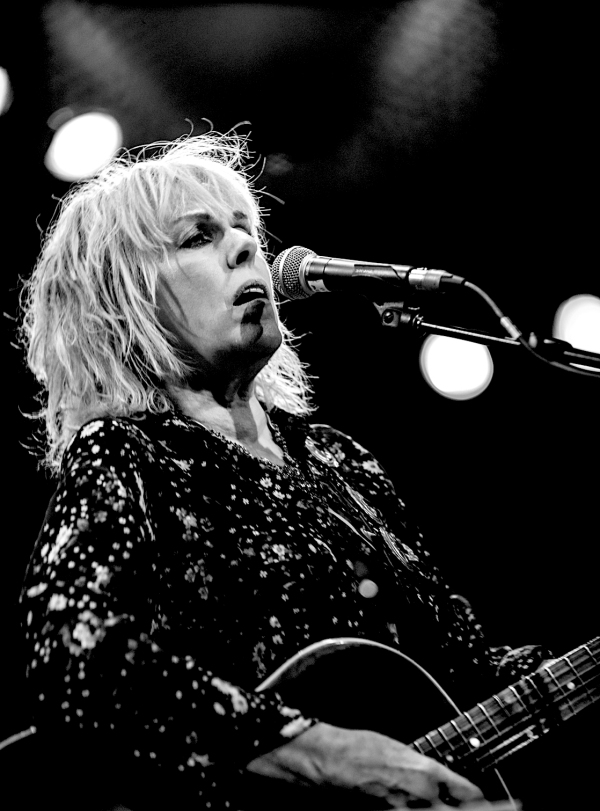Photo by JOSH PELTA-HELLER
Lucinda Williams has a cold. Less than a minute into “Right on Time,” her first song of the night, she stepped back from the microphone saying “shit” under her breath, to reach for a tissue while she shook her head in agitated dismay at someone backstage. The annoyance on her face made me fear a stoic, empty performance lay ahead, or worse yet, a shortened-set meltdown. If her sandpapery voice could barely make it through the first verse of “Right on Time,” there was no way she’d be able to perform the straining high-range melodies of at least half of the other songs from Car Wheels on a Gravel Road.
Or so I thought. Maybe all she needed was that tissue and a swig of water, because after starting from the top of “Right on Time” once more, she didn’t really stop again for the rest of the night. On tour for over a year in celebration of the 20th anniversary of her breakthrough album, Car Wheels on a Gravel Road, Williams seemed determined to deliver the album with a renewed personal storytelling in between that of the songs themselves. Nothing like the hot-and-cold Louisiana diva I’d read about, she brought the album more vulnerability than I or anyone in that room could have predicted from a once distant and serious performer when it came to the songs that could still break her heart.
I’m a new fan of Lu’s. Her music was always sprinkled into the blues and country radio stations of my childhood, but back then I didn’t have the emotional nuance and lived-in wisdom to process the magic and loss at the center of Car Wheels. Years later, someone floated her name as I was going through my own version of a semi-relationship that was as bad of an idea as Williams’ own stream of bass player-related romantic tragedies, and well, I was hooked. Hers is the kind of music that stops the world with you, twisting your heart so badly that you know there will never be any escape from the pain of heartbreak, until somehow there is.
But every love story ever told feels insignificant in the face of “Lake Charles,” “Jackson,” or “Still I Long For Your Kiss” — songs that make you know Williams has been to Hell and back, and lived to tell the tale. And tell it she did last night, as she re-spun old memories of run-ins with Blaze Foley, Steve Earle, and Townes Van Zandt among more personal ones of her family, opening up about subjects she rarely talks about, like the fact that her stepmother was a student in her father’s freshman English class at the University of Arkansas. “That created a little bit of confusion,” she said with a nervous laugh.
With a presentation of old photographs and home movies projected onto a screen above the stage, and a music stand presumably full of notes and lyrics, Williams gave us the grand tour of Car Wheels. Speaking of mental health, family baggage, and the more unfortunate dramas of Louisiana life, Williams seemed to have traded in her famously detached performance demeanor for one of an openness that defied the chorus of “Metal Firecracker.” There were no more secrets to worry about — she put her life out on the table in music and narrative for the whole crowd to bear witness.
In her languorous Louisiana drawl, she imbued the Delta with sweet old world charm, whether she spoke of men drowning themselves in whiskey, toxic nostalgia, or pots of gumbo and dirty rice, pronounced with a warmly lazy slur by Williams as “durry rice.” Mixed into these tinted memories were bluesy guitar licks as fierce as the ones of Muddy Waters, Lightnin’ Hopkins, and other Delta legends that she worshipped in her lyrics. Perhaps after 20 years, reliving the pain of Car Wheels has become relatively routine for Williams, but the fiery washboard-like rhythms of songs like “Can’t Let Go” and “Joy” still have the power to ignite the hundreds on hand at the completely sold out World Cafe Live last night.
Despite her cold, Williams soldiered on bravely, delivering Car Wheels start to finish, interspersed with making-of-a-masterpiece tales, legends and lore that made the set almost twice as long as the album itself. She spoke of politics, poetry, photography, and a book she’s got in the works, delivering her life to the audience in a way that almost made her show seem like a Ted talk. Ending her set with the bittersweet folk of “Jackson,” Lucinda made this much clear last night: she is still the sweetheart of the alt-country rodeo. — SOPHIE BURKHOLDER

